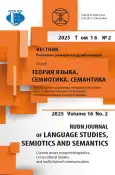Value as a Basic Concept of Cross-Cultural Researches
- Авторлар: Ratnikova A.G.1, Boguslavskaya V.V.1
-
Мекемелер:
- Pushkin State Russian Language Institute
- Шығарылым: Том 16, № 2 (2025): Current issues in psycholinguistics, cross-cultural studies, and multichannel communication
- Беттер: 514-527
- Бөлім: LANGUAGE THEORY
- URL: https://journal-vniispk.ru/2313-2299/article/view/323527
- DOI: https://doi.org/10.22363/2313-2299-2025-16-2-514-527
- EDN: https://elibrary.ru/DUWXFL
- ID: 323527
Дәйексөз келтіру
Толық мәтін
Аннотация
The goal of the study is to determine the characteristics of the concept “value” as a key concept in cross-cultural scientific research. This goal is achieved by the authors in two stages. At the first stage, a comparative analysis of data from dictionaries of national languages - Russian, Vietnamese, Danish and Finnish - is presented. The task of the analysis is to search for and understand the main components of the concept “value”, with which the formation of the linguistic conceptualization of the Russian word “value”, Vietnamese “giá trị”, Danish “værdi” and Finnish “arvo” begins. At the second stage, speech utterances are analyzed. The material was speech utterances of native speakers of the compared linguacultures. The material was taken from Internet sites where online reviews and / or comments are published. The main method at this stage was interpretive analysis, which involves searching, perceiving, understanding and describing linguacultural facts from the standpoint of the research objectives. The novelty and relevance of the research presented in this article is connected with the peculiarity of the approach to the object of consideration: cross-cultural studies of values are a widespread and established method of cognition for such scientific disciplines as, first of all, linguacultural studies, intercultural communication, linguaxiology, but the goal of the presented cross-cultural study is to understand the concept of “value” itself, to find those characteristics of this concept that explain its key role in the task of studying the trinity of language, culture and consciousness. The authors come to the conclusion about the existence of special parameters in the description of the concept “value”: 1) it is a super-concept, which includes all concepts in its image component; 2) it is an antinomic concept; 3) it has a super-value plan of expression, realized through the concept of the priceless. Moreover, the study found the presence in the content of the concept “value” of the trinity in the categories “not valuable” - “valuable” - “priceless”, which implies a strict hierarchy of the structure, ascending vertically from the material “no value/price” to the ideal “that which cannot be assessed/evaluated”.
Негізгі сөздер
Авторлар туралы
Albertina Ratnikova
Pushkin State Russian Language Institute
Хат алмасуға жауапты Автор.
Email: porijoki@nextmail.ru
ORCID iD: 0000-0003-3480-4798
SPIN-код: 8712-3304
PhD in Pedagogical Sciences, specialist at the Laboratory of typological and theoretical linguistics
6 Academician Volgin st., Moscow, Russian Federation, 117485Vera Boguslavskaya
Pushkin State Russian Language Institute
Email: boguslavskaya@gmail.com
ORCID iD: 0000-0003-4118-382X
SPIN-код: 6582-6230
Dr.Sc. (Philology), Professor of the Department of Russian Literature and Intercultural Communication
6 Academician Volgin st., Moscow, Russian Federation, 117485Әдебиет тізімі
- Eremenko, A.V. (2012). Linguistic objectification of the value component of the Marriage concept in aphorisms of American and British authors: a comparative aspect [PhD thesis]. Vladivostok. (In Russ.). EDN: ZOLYPZ
- Maslova, V.A. (2015). The Wanderer in Russian Language and Culture: Value, Concept, Image. Russian Journal of Linguistics, 3, 23–31 (In Russ.). EDN: UIKAVP
- Mamontov, A.S., Boguslavskaya, V.V., Budnik, E.A., Ratnikova, A.G., Trinh Thi Kim Ngoc. (2021). Axiological Linguistics and Nationally Oriented Lexicography: Experience of Interaction (on the Material of Russian-Vietnamese Comparisons). Science Journal of Volgograd State University. Linguistics, 20(1), 101–113. (In Russ.). https://doi.org/10.15688/jvolsu2.2021.1.8 EDN: RBTGLL
- Karasik, V.I. (2019). Language bridges of understanding. Moscow: Discourse. (In Russ.).
- Karasik, V.I. (1997). Language concepts as dimensions of culture (subcategory cluster of temporality). Concepts. Human ecology, 2(2), 156–158. (In Russ.).
- L’yuis, R.D. (2001). Business Cultures in International Business. From collision to mutual understanding. Moscow: Delo. (In Russ.).
- Sorokin, Yu.A. (1994). Ethnic conflictology (Theoretical and experimental fragments). Samara: Russkiy litsey. (In Russ.).
- Hofstede, G. (1980). Culture’s consequences: International differences in work-related values. Beverly Hills: Sage.
- Markelova, T.V., & Petrushina, M.V. (2019). Evaluative Statements in the Communicative Space of the Russian Language. Moscow: IMA. (In Russ.). EDN: ABNCEU
- Larina, T.V., & Ozumenko, V.I. (2016). Ethnic identity in language and communication. Cuadernos de Rusística Española, 12, 57–68. (In Russ.).
- Zhang, Ke, & Denisenko, V.N. (2024). Expression, Thinking, and Cognition: Origins of Differences between the Russian and Chinese Languages. RUDN Journal of Language Studies, Semiotics and Semantics, 15(3), 841–855. (In Russ.). https://doi.org/10.22363/2313-2299-2024-15-3-841-855 EDN: HXKOXQ
- Helkama, K. (2015). Suomalaisten arvot: Mikä meille on oikeasti tärkeää? Helsinki: Suomalasen Kirjallisuuden Seura.
- Tadevosyan, Zhe.V. (1996). Dictionary and reference book on sociology and political science. Moscow: Znanie. (In Russ.).
- Stepanov, Ju.S. (2004). Constants: a dictionary of Russian culture. Research experience. Moscow: Akademicheskij proekt Publ. (In Russ.).
- Kononenko, B.I. (2003). Big explanatory dictionary of cultural studies. Moscow: Veche: AST. (In Russ.). EDN: QOCFON
- Fedyaeva, E.V. (2016). Mind Images as a Form of Reality Cognition. Tomsk State Pedagogical University Bulletin, (3), 73–77. (In Russ.). EDN: VNWJOP
- Boguslavskaya, V.V., Khuong Thi Thu Trang, & Ratnikova, A.G. (2023). Linguoculturological Characteristics of Economic Discourse about the Family in Russian, Vietnamese and Danish Media. Science Journal of Volgograd State University. Linguistics, 22(4), 167–179. (In Russ.). https://doi.org/10.15688/jvolsu2.2023.4.13 EDN: HUCYLC
- Dem’yankov, V.Z. (1999). Interpretation as a tool and object of linguistics. Voprosy filologii, 2, 5–13. (In Russ.). EDN: SIJPOP
- Dem’yankov, V.Z. (1994). Morphological interpretation of the text and its modeling. Moscow. Moscow State University Publ. (In Russ.). EDN: RXTBVX
Қосымша файлдар









